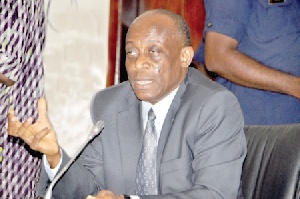 Seth Terkper, Minister of Finance
Seth Terkper, Minister of Finance
The public sector wage bill last year exceeded the budgeted amount by almost GH¢270million despite a freeze on public sector employment; proving once again the challenge that confronts government in maintaining the wage bill within budget limits as demanded by the International Monetary Fund.
According to the preliminary fiscal data from the Finance Ministry released last week, which sums up government’s revenue and spending for the entire 2015, the state spent a little above GH¢10.55billion on public sector workers’ wages and salaries as against a budget of GH¢10.28billion.
The amount expended on wages and salaries constitutes about 44 percent of the tax revenue collected in the year, and also makes up about 7.9 percent of GDP.
The fiscal data also show that about GH¢800million more of wages is in arrears.
In spite of the budget overruns on wages and salaries, however, the overall spending on public sector compensation -- made up of salaries, pensions, gratuities and social security transfers -- was GH¢12.1 billion; below the budgeted amount of GH¢12.3billion for the year, which should provide some comfort for government.
Over the years, successive governments have struggled to contain the country’s bulging wage bill even as recruitment into the public sector has for some time now been frozen in concert with implementation of the US$918million Extended Credit Facility Agreement government entered into with the IMF in April last year.
Expectations are high among managers of the economy and their multilateral partners that the budget overruns in relation to wage bill will at least this year be contained, as for the first time in the country’s history government and organised labour concluded negotiations on the national minimum wage and base pay before the 2016 budget was finalised.
However, organised labour is demanding an additional increment in wages, which they explain has become necessary since t gains from the increment in base pay have been eroded by several other tax measures implemented by government afterward.
Since the 2016 budget was presented to Parliament in November last year, utility tariffs have been increased substantially; with electricity and water tariffs going up by 59.2 and 67.2 percent respectively. Additionally, the implementation of a raft of taxes -- especially the recently introduced Energy Levies -- have pushed up petroleum prices by at least 35 percent since January this year, with the start of ECOWAS Common External tariffs also increasing prices of imported goods by about 20 percent.
The pass-through effects of these increments have spiked inflationary pressures, with the inflation rate now pegged at 18.5 percent from 17.6 percent in November.
Nonetheless, government is insistent on maintaining the wage bill within the budget limit, since any compensation-related slippages or overruns could compromise the fiscal consolidation programme.
Finance Minister Seth Terkper is concerned further growth in wages will derail government’s ongoing fiscal consolidation efforts, crowd out investment in infrastructure and social programmes, and generate worse economic outcomes; a stance that has received backing from President John Mahama.
Controlling the growth of wages to lower the share of state revenue they absorb is key among government’s efforts to cut the budget deficit this year to 5.3 percent of GDP, and rebalance spending in favour of public investment.